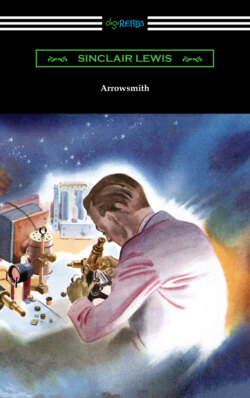Читать книгу Arrowsmith - Sinclair Lewis - Страница 16
На сайте Литреса книга снята с продажи.
ОглавлениеIII
When he was depressed by a wonder as to why he was here, listening to a Professor Robertshaw, repeating verses about fat-eared Germans, learning the trade of medicine like Fatty Pfaff or Irving Watters, then Martin had relief in what he considered debauches. Actually they were extremely small debauches; they rarely went beyond too much lager in the adjacent city of Zenith, or the smiles of a factory girl parading the sordid back avenues, but to Martin, with his pride in taut strength, his joy in a clear brain, they afterward seemed tragic.
His safest companion was Clif Clawson. No matter how much bad beer he drank, Clif was never much more intoxicated than in his normal state. Martin sank or rose to Clif’s buoyancy, while Clif rose or sank to Martin’s speculativeness. As they sat in a back-room, at a table glistening with beer-glass rings, Clif shook his finger and babbled, “You’re only one ’at gets me, Mart. You know with all the hell-raising, and all the talk about bein’ c’mmercial that I pull on these high boys like Ira Stinkley, I’m jus’ sick o’ c’mmercialism an’ bunk as you are.”
“Sure. You bet,” Martin agreed with alcoholic fondness. “You’re jus’ like me. My God, do you get it—dough-face like Irving Watters or heartless climber like Angus Duer, and then old Gottlieb! Ideal of research! Never bein’ content with what seems true! Alone, not carin’ a damn, square-toed as a captain on the bridge, working all night, getting to the bottom of things!”
“Thash stuff. That’s my idee, too. Lez have ’nother beer. Shake you for it!” observed Clif Clawson.
Zenith, with its saloons, was fifteen miles from Mohalis and the University of Winnemac; half an hour by the huge, roaring, steel interurban trolleys, and to Zenith the medical students went for their forays. To say that one had “gone into town last night” was a matter for winks and leers. But with Angus Duer, Martin discovered a new Zenith.
At supper Duer said abruptly, “Come into town with me and hear a concert.”
For all his fancied superiority to the class, Martin was illimitably ignorant of literature, of painting, of music. That the bloodless and acquisitive Angus Duer should waste time listening to fiddlers was astounding to him. He discovered that Duer had enthusiasm for two composers, called Bach and Beethoven, presumably Germans, and that he himself did not yet comprehend all the ways of the world. On the interurban, Duer’s gravity loosened, and he cried, “Boy, if I hadn’t been born to carve up innards, I’d have been a great musician! Tonight I’m going to lead you right into Heaven!”
Martin found himself in a confusion of little chairs and vast gilded arches, of polite but disapproving ladies with programs in their laps, unromantic musicians making unpleasant noises below and, at last, incomprehensible beauty, which made for him pictures of hills and deep forests, then suddenly became achingly long-winded. He exulted, “I’m going to have ’em all—the fame of Max Gottlieb—I mean his ability—and the lovely music and lovely women—Golly! I’m going to do big things. And see the world. . . . Will this piece never quit?”
